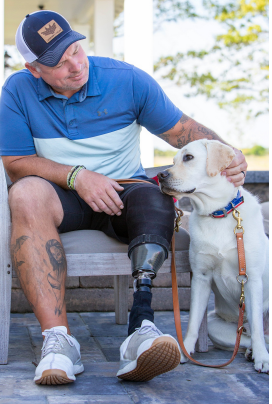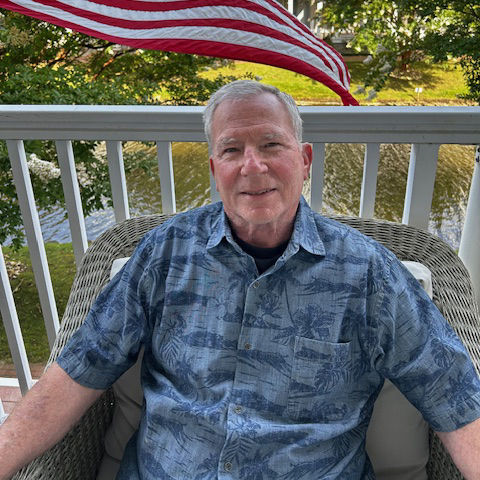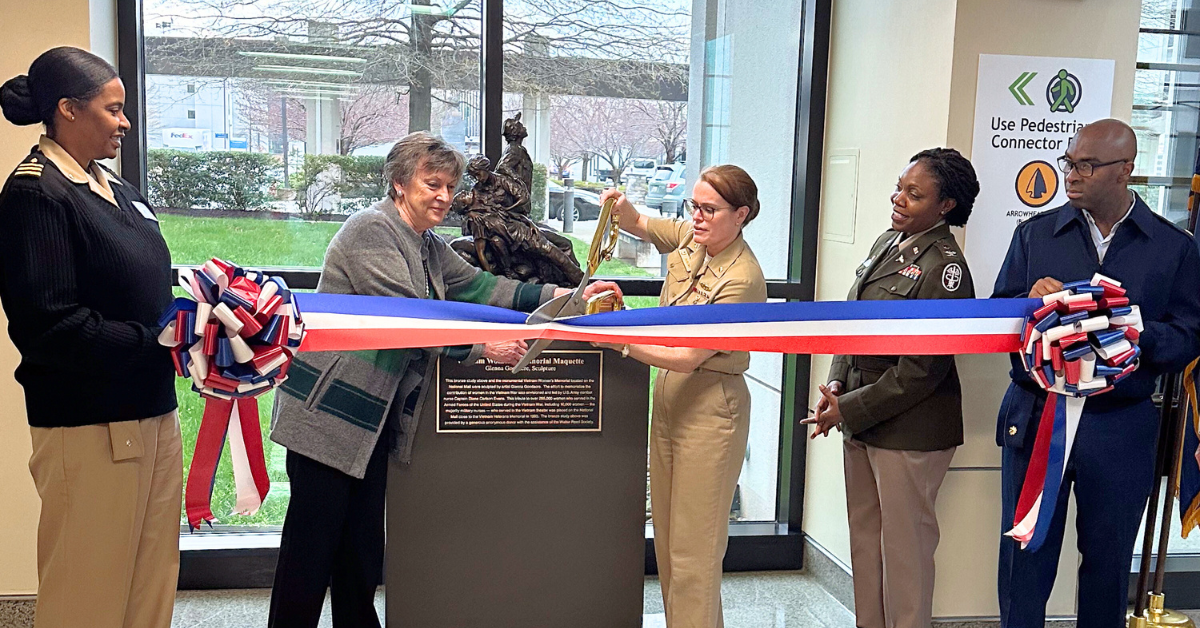5 years, 9 selections, $1,652 in donations
Since July 2019, Walter Reed Society has been selected to benefit from the Giant Food Community Bag Program nine times at three different Giant Food locations. In total, the organization has received $1,652 in donations to continue providing financial assistance to military service members and their families, supporting staff at the Walter Reed National Medical Center, and furthering the work of other local nonprofits.
Tell us about Walter Reed Society.
Walter Reed Society is a volunteer organization established in 1996 to support the patients, staff, and legacy of Walter Reed National Military Medical Center.
First, I want to say a few words about Walter Reed, an army physician back in the 1800s. Through his research in Cuba, he discovered the connection between mosquitoes and yellow fever. Before that time, people were dying of yellow fever all over the world and didn’t know the cause. Once they knew, they began controlling mosquitoes, and yellow fever went away. Walter Reed’s research was unbelievably impactful for the whole country. Walter Reed was also a teacher at the Army Medical School and the curator of the Army Medical Museum. He even started his own library, the Surgeon General’s Medical Library.
Since he was critical to army medicine, his supporters built a hospital in his name in 1909. Today, the Walter Reed National Medical Center is located in Bethesda, Maryland. As a hospital, Walter Reed is the flagship for military medicine. Our troops who need specialized care are often sent to Walter Reed National Military Medical Center from all over the world. It also serves our country’s presidents.
What services do you provide to the community?
At Walter Reed Society, we provide funding to assist military service members, both current and past, and their families who previously have been treated at Walter Reed or other affiliated hospitals. When other financial sources are unavailable, we also give grants to people for their medical health care. Often, these are things that their insurance company or the government can’t provide for them. In the last 20 years, we’ve given over $3.5 million in grants. In 2024 alone, we gave our target population $140,000 worth of grants.
In the last 20 years, we’ve given over $3.5 million in grants. In 2024 alone, we gave our target population $140,000 worth of grants.
As an example of our financial assistance, we gave a grant to the family of an active-duty soldier deployed in Korea. His wife could not go with him and was living in Maryland with their child, who has a rare pediatric condition that requires extensive home medical assistance care. We also gave a grant to the dependent of a retired service member whose wife needed a kidney transplant at Walter Reed. The family traveled from out of state and spent a lot of time at Walter Reed. While they could cover their travel and housing costs, they still had bills back home that they couldn’t pay. We paid those bills to ensure the wife got the treatment she needed.
As another example, we purchased a specially designed wheelchair for a 7-year-old autistic child whose insurance would not cover it. Similarly, we purchased a specially modified wheelchair for the dependent of an active-duty service member with spina bifida. We also supported a 20-year-old active-duty person who had an inoperable cancer and needed a special wheelchair that wouldn’t require arm strength to operate. We purchased a modified wheelchair to give him more independence.
These grants go to individual patients, but that’s not where our services stop. We also provide a lot of support to the hospital staff. In 2024, we gave $82,000 to the staff at Walter Reed and affiliated hospitals in the area. Over the past 20 years, we have provided over $730,000 to support staff.
Through these funds, staff received memory skill training at the Internal Medicine Department at Walter Reed. The money also sponsored symposiums on leadership and ethics for chief residents and staff members. Our financial grants even supported a graduation ceremony for medical residents and an appreciation week for nurses.
The third and last category of grants are for nonprofit organizations. While they are not directly related to the hospital, these organizations provide services to our general target audience. In 2024, we supported other nonprofit organizations that serve military service members and their families by providing more than $173,000 in grants.
For example, we started partnering with Leashes of Valor, an organization that trains dogs to assist veterans with unique issues. Our grants supported the extensive training of two dogs, which we named Wal and Emily in memory of Walter Reed and his wife. Moving forward, we will continue to support two dogs each year.
We are partnering with the Disabled Americans (DAV) to provide quarterly dinners for disabled veterans at the American Legion Post 41 in Silver Spring and collaborate with Fisher House, where patients at Walter Reed can stay for free. Our organization provides annual support to Wreaths Across America. The office at Walter Reed also works with the Red Cross to provide handheld calming devices to service members who have PTSD, anxiety, or pain disorders. We also support various programs at Blue Star Families, the biggest organization in the United States that supports active-duty military service members and their families.

How has the Walter Reed Society used the donations from the Giant Food Community Bag Program to further its mission?
We put all of these donations into our general pot to use in ways that will best serve our target audience and the larger community. Our donations help us provide grants to military service members, both current and past, and their families, support staff at Walter Reed hospitals, and assist other nonprofits and community partners. Everything goes into a general fund, and we spend it where it is most needed.
Our donations help us provide grants to military service members, both current and past, and their families, support staff at Walter Reed hospitals, and assist other nonprofits and community partners.
I want to thank the Giant Food Community Bag Program for being a partner and providing us with such nice services and funds for several years now. It’s been very useful, and we hope to continue to have that support in the future.
The more people who know about this program, the better. It is good for both Giant Food and Walter Reed Society. In the Maryland area, there are a lot of Giant Food supermarkets, and there are also a lot of veterans. 7% of the population in Maryland are veterans, many of which are Giant customers. We appreciate any support from Giant to help us serve that population.
Tell us a story about a program, service, or initiative that the Giant Food Community Bag Good Program has supported.
We purchased a cubby bed, a safety bed specially designed for hyperactive kids who risk hurting themselves by trying to get out. We have given out several of these types of beds, but one in particular was given to an active-duty service member’s 8-year-old son, who has autism and a developmental delay. His parents wrote us a letter about the unbelievable impact that one gift had on their lives.
The letter reads:
Dear Walter Reed Society,
Thank you for the generous gift of the cubby bed for our child. He has been struggling with achieving safe and comfortable sleep for years due to his medical issues. When his bed arrived, he was healing from a back injury and was having a lot of difficulty with daytime activities and sleep alike. Numerous aspects of his life changed for the better.
Once you provided the cubby bed, we were able to move our son into the bedroom next to ours, which he had previously been unable to use because he would try to climb onto the floor vents. We no longer have to child lock his door. Since he is safely contained in his cubby bed, we are able to place an air purifier inside his room to improve air quality and support his breathing overnight. Since he can no longer elope from his bed, he is now peaceful and comfortable at bedtime.
With better sleep, his back healed more quickly. His seizures are also better controlled as a result of improved sleep and injury prevention. His delightfully loving personality reemerged as he was able to rest in a calm, safe bed consistently.
Our son is also able to have toys, books, and clothing in his room, as well as artwork on his walls. Those little details give him a sense of normalcy and comfort that was not possible before he received his cubby bed. Our son has begun to thrive this school year and even received a Star Student award from his principal. He has shown improved participation in therapies, which have helped him progress his skills at home, in the classroom, and in the community. Overall, our son has better health and a more successful recovery from his inevitable setbacks.
Thank you for providing our son with a cubby bed this past year. The quality is excellent, and it will support his best possible health and happiness for many years to come. You have tremendously blessed our son, our family, and all who know him.
Finally, our son adds, “I love my bed. So cozy! Thank you so much.”
The note really stood out because it was such an articulate way of saying how impactful a single thing can be. Those beds are very expensive but can change the lives of a whole family. This is one of thousands of stories about the lasting impact of the work we do.
This is one of thousands of stories about the lasting impact of the work we do.

Interview with Rick Erdtmann, Liaison to Nonprofit Organizations

